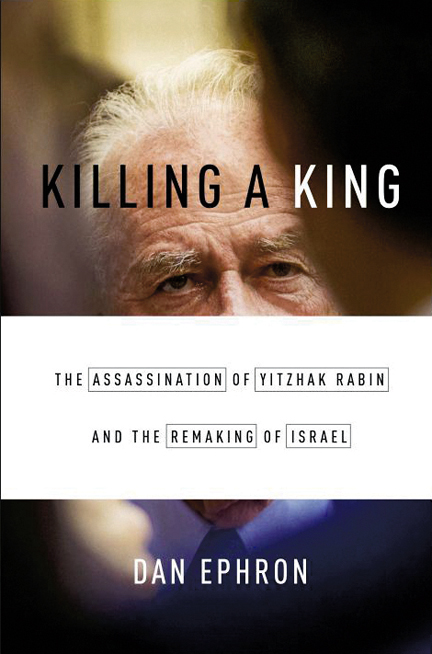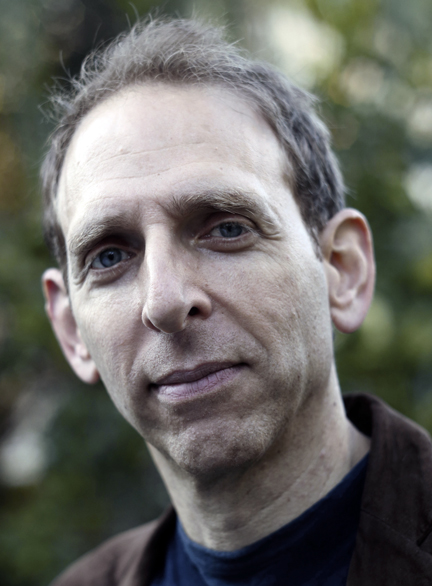Two decades on, understanding Israel through the lens of Rabin killing

By Pam Ferris-Olson, Special To The Observer
Sometimes history reads like a suspense novel; that’s exactly how to describe Dan Ephron’s new book, Killing a King: The Assassination of Yitzhak Rabin and the Remaking of Israel.
It is because Ephron served as the Jerusalem bureau chief for Newsweek and the Daily Beast and lived in Israel on and off for nearly two decades that he has the necessary understanding to provide a riveting account of the two years leading up to as well as the assassination of Israel’s past prime minister.
In addition to his firsthand experience — he was at the square when Rabin made his fateful speech — Ephron reviewed hours of tapes produced in the interrogation of the assassin, and worked with Rabin’s daughter, Dalia, to solve a previously unanswered conspiracy question.
Ephron will talk about Killing A King on Dec. 1 as part of the JCC’s Cultural Arts & Book Fest.
He says he set out to write a murder story about Yigal Amir, a radical 25-five-year-old Jewish college student, who in 1995 assassinated Rabin with only a handgun and a simple plan.
Rabin had become controversial as a result of his efforts with PLO Chairman Yasser Arafat and Israel Foreign Minister Shimon Peres to produce the Oslo Accords, agreements designed to broker land for peace between the Palestinians and Israel.
The three men received the Nobel Peace Prize in 1994 for their work on the accords.
Amir saw the accords as an unforgiveable betrayal.
“The story of the assassination is rich in human drama,” Ephron says. He sees parallels between the assassinations of Rabin and U.S. President Abraham Lincoln.

In terms of the current climate in the Middle East Ephron believes that “the assassination was so pivotal, anyone interested in Israel then and now, in understanding the Israeli-Arab conflict, will get something from the book.”
The reason Ephron chose to write Killing a King 20 years after the assassination is that he believes the event remains the single most consequential one in Israel’s recent history.
The murder of Rabin led to a dramatic shift in Israeli policies. Although Rabin had a 27-year career as a soldier, serving among other roles as chief of operations during Israel’s War of Independence and, in 1964, as chief of the general staff overseeing Israel’s victory in the 1967 Six-Day War, he was a pragmatist.
Ephron describes Israel’s current prime minister, Benjamin Netanyahu — who was first elected prime minister in 1996 and served three years — as the opposite of Rabin, with “a deep reluctance to make territorial concessions to the Palestinians.”
“The book is not a counter-factual history. It’s impossible to know what would have happened. In some ways, the most exasperating thing about the murder is that we’ll never know how close Rabin would have come to forging peace with the Palestinians and the rest of the Arab world.”
Ephron takes on the role of modern-day forensic detective when he transports Rabin’s blood-spattered dress shirt and undershirt, worn the night of the assassination, from Israel to Arizona so a firearms specialist can examine holes in the garments.
In addition to the two bullet holes made by Amir’s handgun in the back of the shirt, there is a round hole about the size of a dime in the front.
While many conspiracy theories surround Rabin’s assassination, Dalia Rabin has been intrigued by the hole in the front of her father’s shirt.
She wondered if the hole indicated a cover-up designed to hide a blunder made by the Israeli detail assigned to protect her father.
Ephron describes the various laboratory tests used to solve the mystery. Among them was firing a 9 mm Beretta loaded with Winchester hollow-point bullets — like the weapon and ammunition used by Rabin’s assassin — in order to compare the pattern with the unexplained holes.
Read the epilogue of Killing a King to discover the answer.
In terms of political mysteries, Ephron says he is no expert in solving the hostilities between Israel and the Palestinians.
He recognizes that the developments have become complicated after Rabin’s death. His assessment of the situation is that Israel is more secure now than it has been in decades because there is no functioning Syrian Army and Iraq is not currently a threat.
Additionally, the peace deals with Jordan and Egypt have held up despite the dramatic events that have occurred during the past five years.
Ephron does cite that from the Israeli security chiefs he’s “interviewed over the years — and you can see this in their public statements — the fact that Israel has not reached an accommodation with the Palestinians is itself a threat to Israel’s long-term security.”
The JCC’s Cultural Arts & Book Fest will present author Dan Ephron on Tuesday, Dec. 1 at 7 p.m. at the Boonshoft Center for Jewish Culture and Education, 525 Versailles Dr., Centerville. Tickets are $5 in advance, $8 at the door, and are available at jewishdayton.org, by calling 610-1555, or at the Boonshoft CJCE.
To read the complete November 2015 Dayton Jewish Observer, click here.

